DAR chapter starts in Detroit and has a member who made history
- Oops!Something went wrong.Please try again later.
As a board-certified dermatologist, Dr. Aliya Hines’ life has been deeply rooted in science and medicine.
But for a period of time during the first Saturday afternoon in December, Hines was more interested in talking about “magic.”
And the magic she described was connected to a recently formed Detroit chapter of the National Society Daughters of the American Revolution (DAR).
“There is magic in people working together to build something greater than our individual selves,” said the 46-year-old Hines about DAR, a nonpartisan, volunteer, women’s service organization with a 133-year history that officially made its return to Detroit on Aug. 19 with the organizing meeting of The Detroit Chapter held at the historic Detroit Yacht Club.
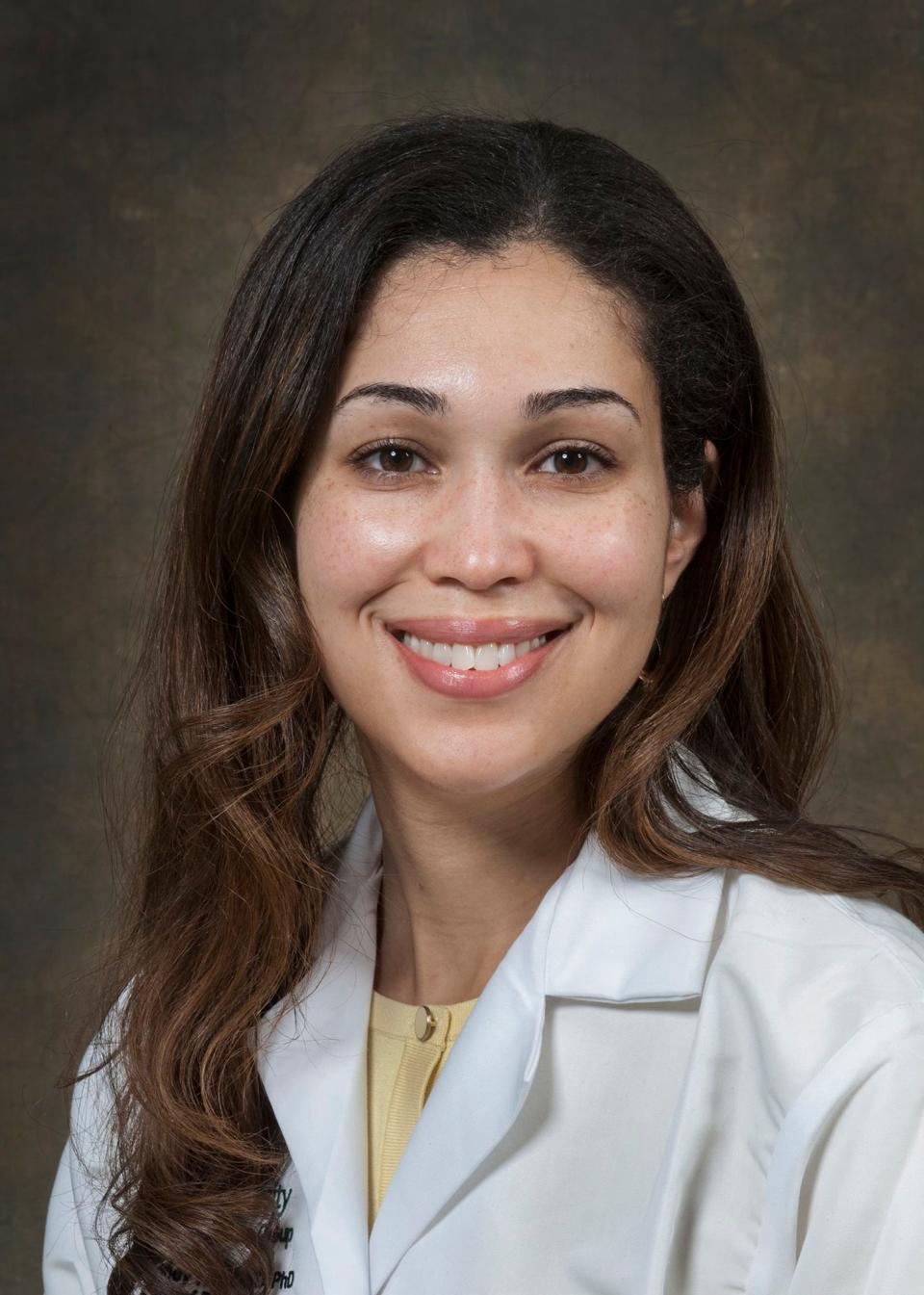
DAR’s name reflects an organization whose more than 190,000 current members are descended from Revolutionary War patriots and soldiers. In 1977, following an intense quest of nearly two years to learn her family’s history, Detroit native Karen Batchelor (then Karen Farmer) made DAR history and the front page of the New York Times (Dec. 28, 1977) by becoming the organization’s first known Black member, after being sponsored by members of DAR’s Ezra Parker chapter in Royal Oak.
Hines, a staff physician at the John D. Dingell VA Medical Center and a Wayne State University School of Medicine associate professor, was put in contact with Batchelor by a medical colleague. A face-to-face meeting between Hines and Batchelor ensued at the AWAKE Cafe in Midtown during May. That introduction, along with extensive genealogical research previously conducted by members of Hines’ family, set the stage for Hines to become the first member to join The Detroit Chapter without a previous DAR membership.
In Batchelor, Hines says she quickly found a friend and supporter who shared “a vision of a more diverse picture of what it means to be a patriot and an American.” But Hines also revealed that DAR’s commitment to helping people in need — which includes more than 3.5 million hours of volunteer service performed nationally by members during 2023 alone — allows her to double-down on an approach to living that was instilled in her while growing up in what she described as a small and diverse community within Yellow Springs, Ohio, home to Antioch College.
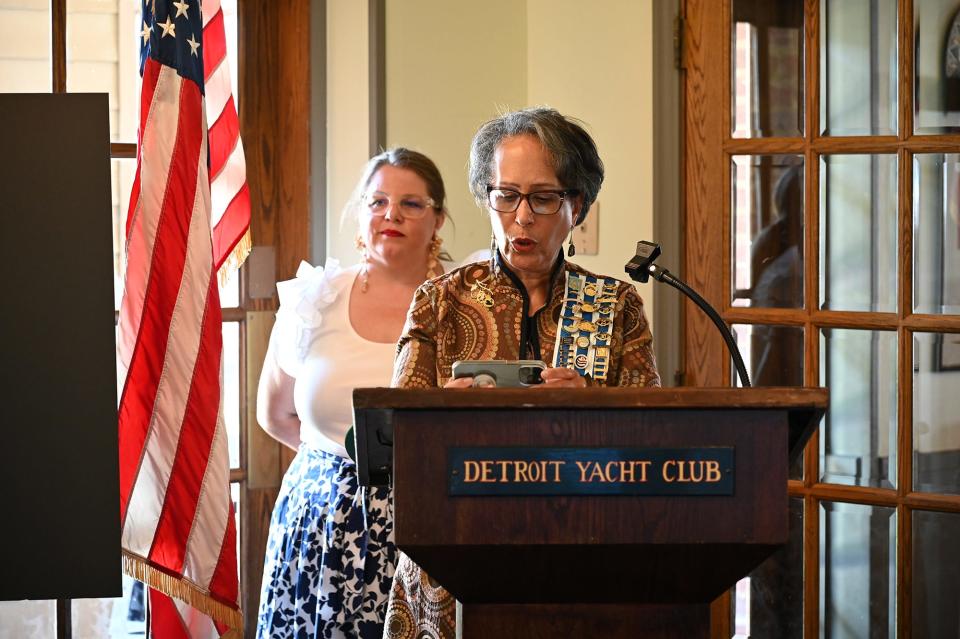
“Be ashamed to die until you have won some victory for humanity,” Hines proudly stated on December 2 as she recited the Antioch College motto, which Hines, a graduate of Hampton and Johns Hopkins universities describes as a call to action that is embraced by residents across her hometown regardless of where they attended school. “Those words continue to inspire me and now that I’m in Detroit, I want to see the community I live in excel. And two of the most obvious things that I look forward to doing with our chapter is helping our Detroit schools and students, and our veterans — particularly women veterans — who have unique challenges.”
On Saturday, Dec. 16, Hines will have an opportunity to share her ideas for DAR service programs with about 30 like-minded people at a metro Detroit location when The Detroit Chapter presents “It Started With Tea” to mark the 250th anniversary of the Boston Tea Party. In addition to fellowship, tea and food, the event’s activity menu also will include honoring a special group of Detroiters outside of the DAR membership that address critical community issues including food insecurity, literacy and homeless women.
“Every DAR chapter has a different flavor and our flavor is Detroit,” says 48-year-old Elizabeth Findeis, who serves as the chapter’s regent, a position Findeis likened to a CEO while speaking from her home in Indian Village on the morning of Dec. 1. “When you talk to Detroiters you can feel that spirit. Or when a new store opens in Detroit and people come out to support it, you feel that spirit. There is a tenacity and spirit that people in Detroit have and we want our chapter to represent that as well.”
A self-described “fixer” both as a senior research associate for Henry Ford Health and as a community volunteer, Findeis, a native of Huntington, N.Y., moved to Detroit on Christmas Eve 2010 with her family and helped to revitalize the parents group at Gesu Catholic School while living in the University District. However, when Findeis first set out to join a DAR chapter located in the city of Detroit, she was stymied. But only temporarily.
“When I couldn’t find a DAR chapter in Detroit, I was thinking: ‘This is crazy,’" explained Findeis, who also described her need to connect with a DAR chapter that “spoke to her soul” in the same way the chapter she belonged to in Alexandria, Va. had done. “We knew starting a new chapter in Detroit would be hard work, but we felt there is a need given the city’s population and the number of veterans we have. It’s just the right thing to do and past time to do it.”
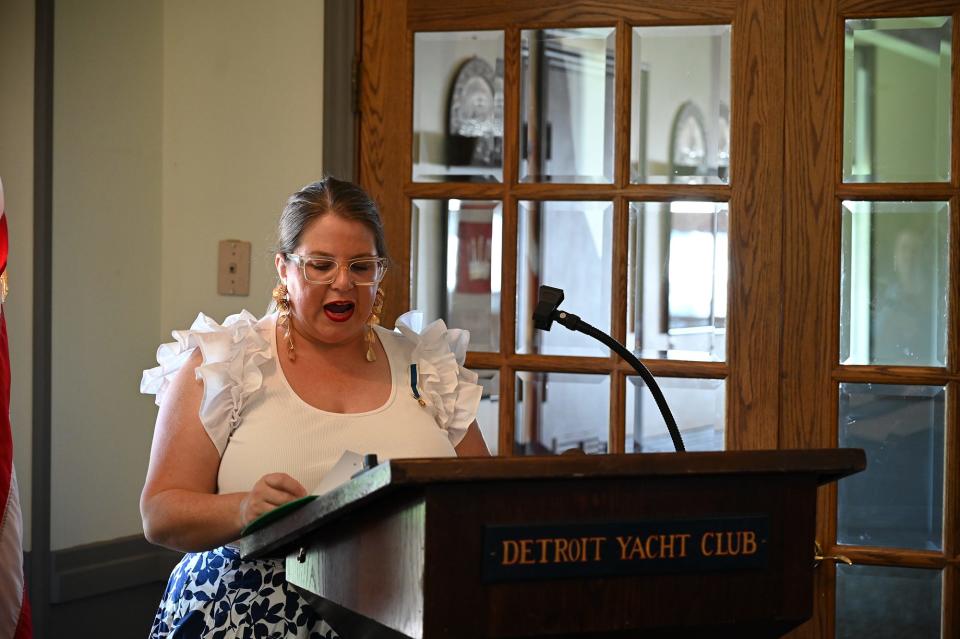
While delivering remarks during her group’s organizing meeting, Findeis said that one of The Detroit Chapter’s goals is to “weave magic into the racially diverse quilt that we all live in.” She also said that the chapter wanted to “meet the people where they are at for a better understanding of who they are and their needs, while having them learn who we are and what we are about for better community outreach.” Findeis confided that crafting the speech she made on Aug. 19 to an audience consisting primarily of DAR members was a demanding and reflective process for her. And Findeis said that an equally thoughtful and truthful approach is needed when Detroiters are introduced to DAR, an organization that in 1984 — seven years after Karen Batchelor’s admission — reached an agreement to revise its National Bylaws to bar discrimination by any of its chapters on the basis of race or creed following the late Lena Santos Ferguson’s three-year struggle (1980-1983) to join a Washington, D.C. chapter.
“DAR is not just for white women, it’s for everyone,” said Findeis, whose enthusiasm throughout the conversation never gave a hint to the pain she admitted to still feeling after recent hand surgery. “Our chapter should reflect who we are as a community. However, we’re also very respectful of other local genealogical organizations. We’re not the only game in town. But, to anyone wishing to join us, you will be more than welcomed.
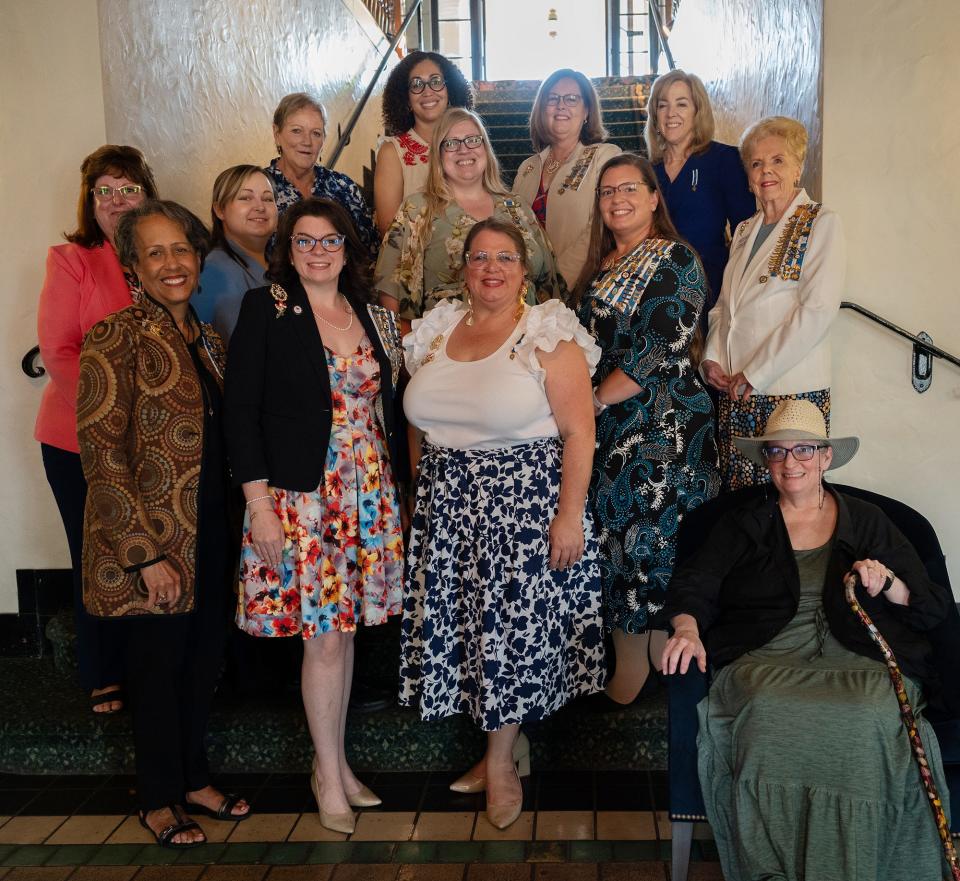
“And what we want to show Detroit is that we’re here to work with the community. If a kid wants to learn genealogy; or learn about their family; or needs help with reading; or wants to find out about scholarships; we’re here for them. That also applies to families because you can never have too many resources.”
For the now 72-year-old Karen Batchelor, as she explained on the morning of Dec. 6, the founding of The Detroit Chapter puts her exactly where she wanted to be in 1977 when DAR members in Royal Oak sponsored her membership after she had been “rejected” by a DAR chapter that was then located in the city of Detroit. Because Batchelor says she harbors no ill will from the experience, she did not want to call attention to that chapter that still exists today, outside of Detroit. Batchelor also did not want to publicly disclose the time and location of the new Detroit chapter’s Dec. 16 tea party because of her own safety concerns for the entire group. But like Findeis, Batchelor believes it is through service that the new chapter has the best opportunity to gain community allies and make a positive difference in her hometown.
“We can’t fix anything that has happened in the past, but we want to move forward,” said Batchelor, who plans to wear 18th Century-era clothing to the tea party, which appeals to the “little kid” in her that “likes to play dress-up,” while also connecting with a group of her ancestors from that period. “For many years, we were the only major city that didn’t have a DAR chapter and we felt that Detroit was being underserved by our organization. We’re always looking for new, innovative and impactful ways to give back to our community, including issues that haven’t received much attention like period poverty.
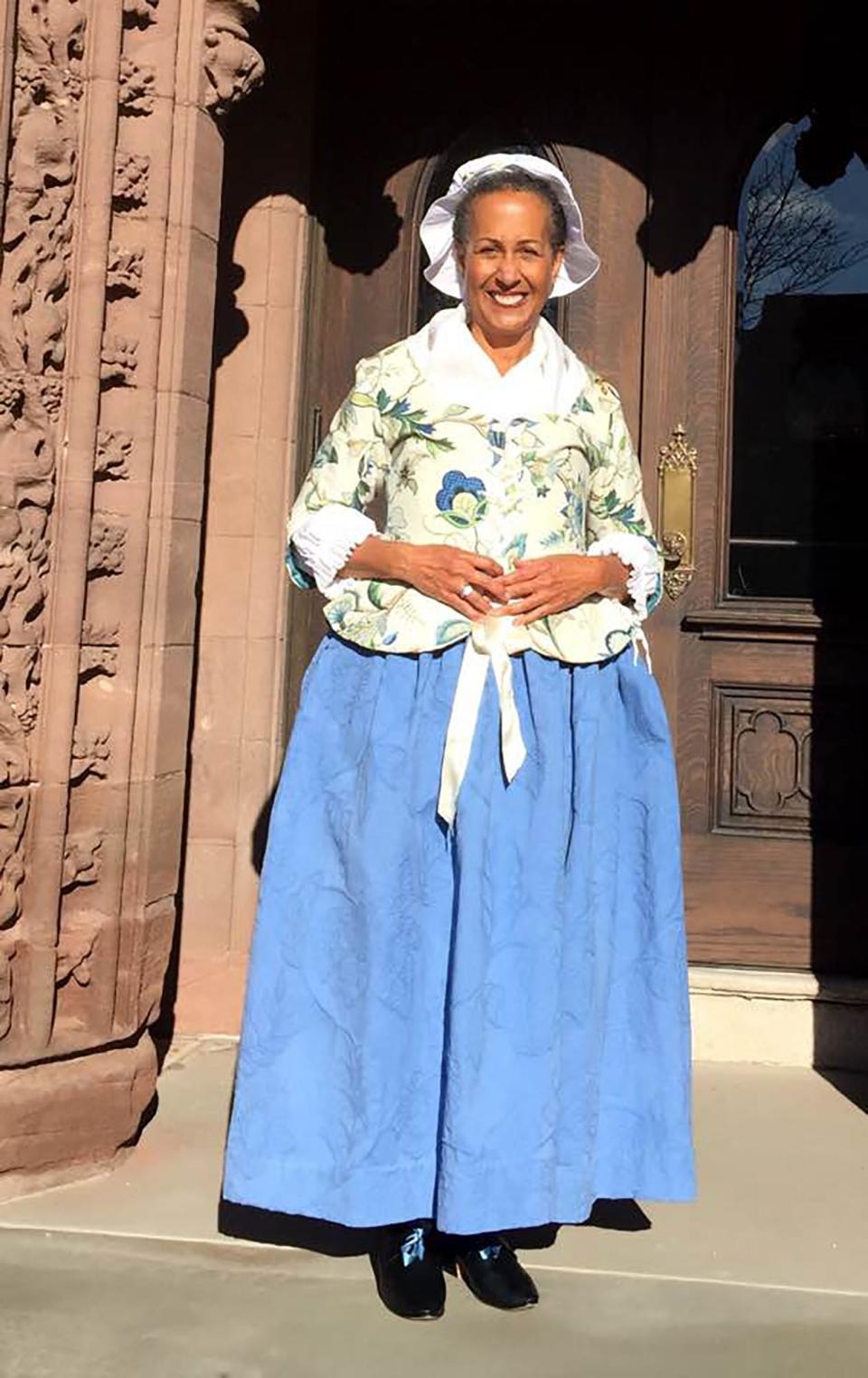
“If people keep an eye on us, they’re going to see that we’re going to be doing great things as we work with and for our city. And there will be activities that everyone can participate in, like workshops on how to research family history.”
One person who has all the details about the Dec. 16 tea party and has been counting down the days for a while is 52-year-old Michelle Campbell, who will be making the drive all the way from Caldonia, near Grand Rapids on the western side of the state, with planned stops in metro Detroit to pick up her mother, 72-year-old Helen G. Campbell and her grandmother, 103-year-old Beaulah Mae Seabrooks — all DAR members. For a period of Michelle Campbell’s life, most of her activities were largely confined to a small area on Detroit’s west side as she was being educated at Greenfield Peace Lutheran School, St. Scholastica and Benedictine High School (Class of 1989). However, after graduating from Michigan State University in 1995 with a degree in electrical engineering, Campbell was determined to see more of the world, which was good news for companies like Motorola Solutions and L3Harris Technologies, where Michelle Campbell excelled professionally. But now, Michelle Campbell says, she is delighted to be reconnected with her home state and the new DAR chapter in Detroit is adding to her enjoyment and sense of purpose.
“I had to be a part of The Detroit Chapter,” said Michelle Campbell, a product marketing manager for Bosch, who once rented out a hotel banquet room in Southfield to give a presentation about her family’s history and has made it a point throughout her career to hire Black women from Michigan State’s College of Engineering for summer internships and permanent employment. “I’m at peace to be back in Michigan and I couldn’t be happier to be a part of this chapter. This helps me to fulfill my purpose. And through this platform, I can help other people from my community to understand and execute their purpose, because you need to know where you came from to know where you’re going.”
This article originally appeared on Detroit Free Press: Detroit DAR chapter to celebrate Boston Tea Party anniversary

